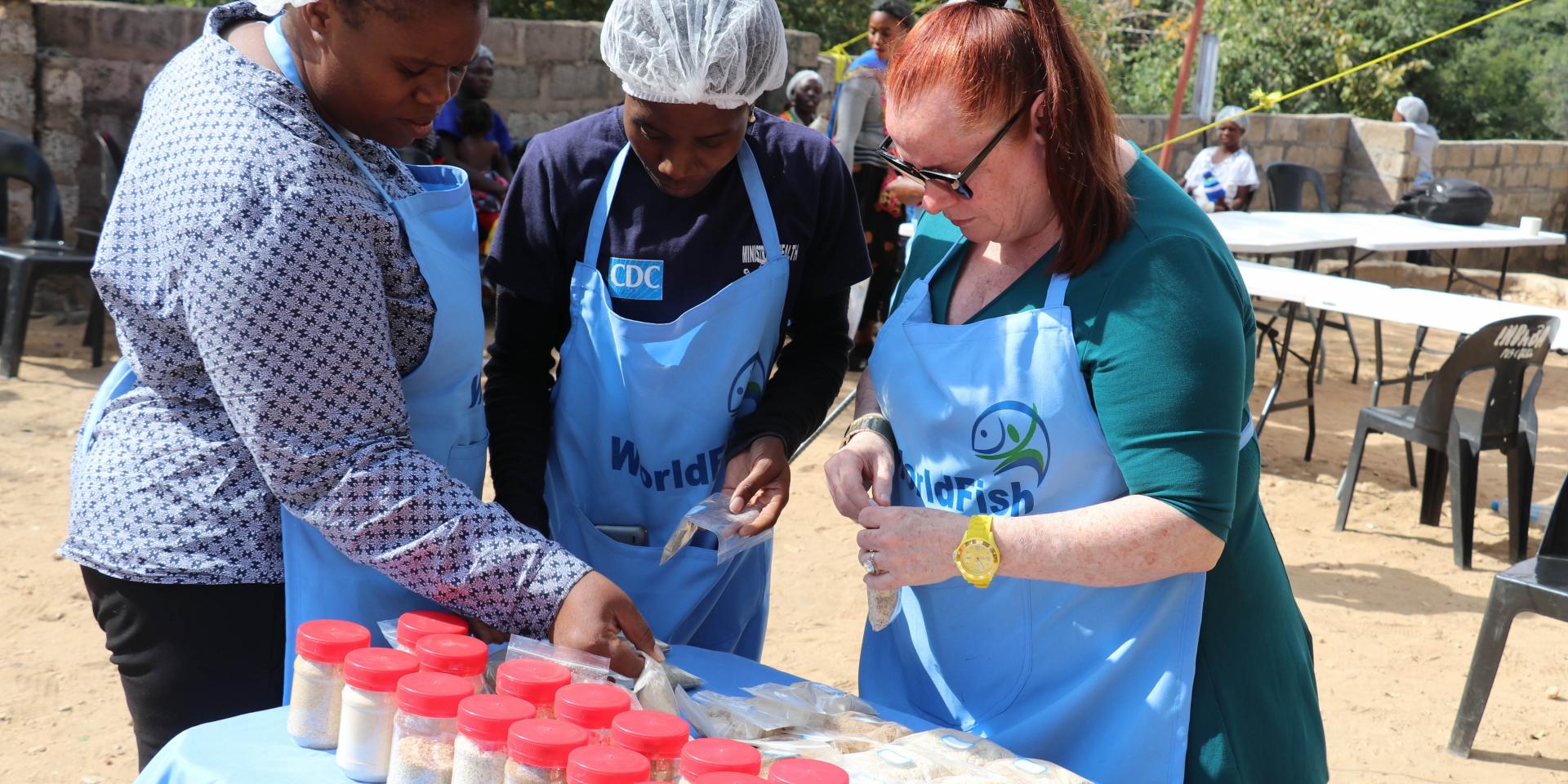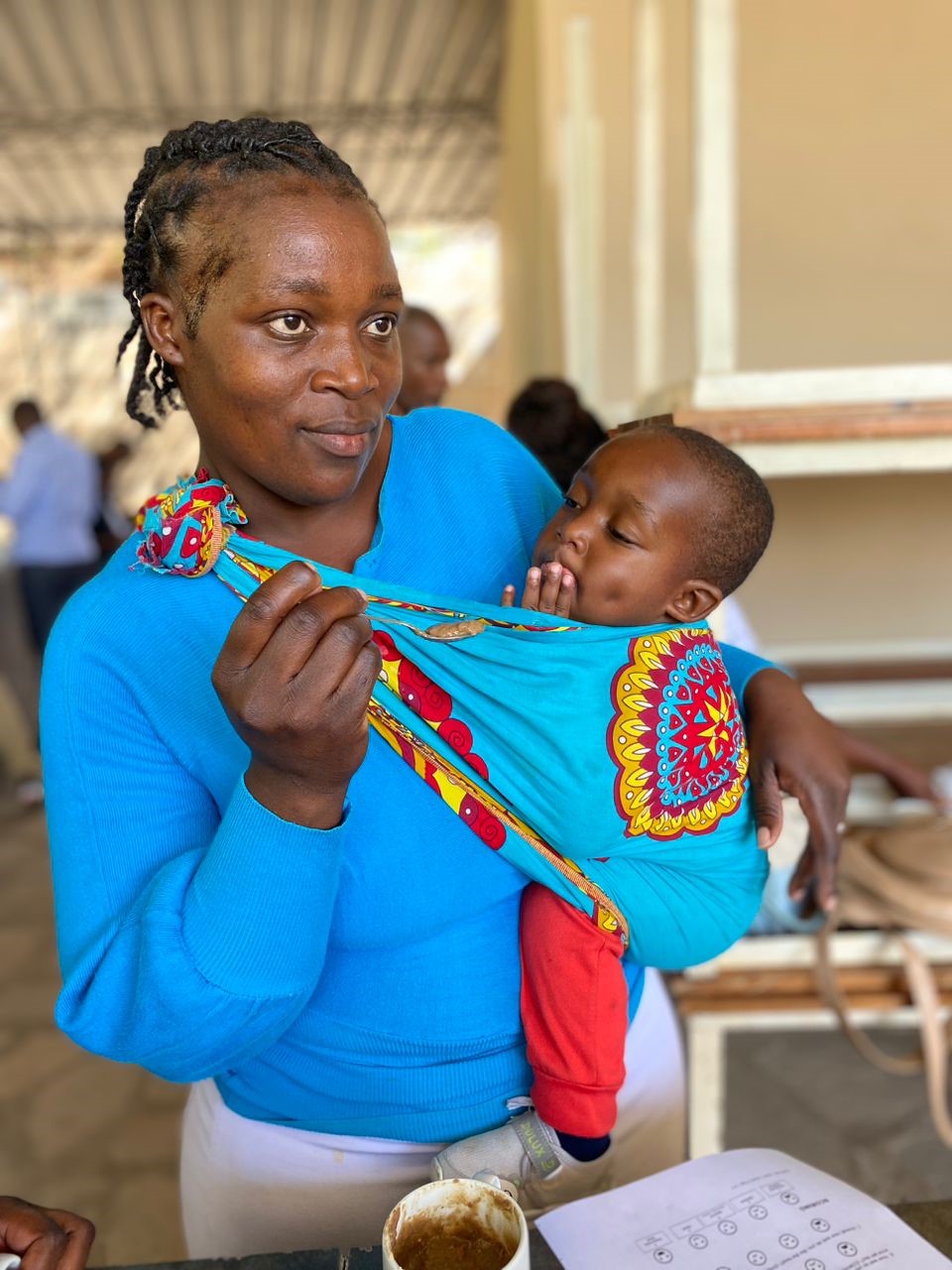Porridge Set to Improve Women’s Participation in Fishing in Southern Zambia
 Photo: Agness Chileya
Photo: Agness Chileya
A nutrient-rich instant porridge made from fish has positively been evaluated to improve the nutrition and livelihoods of women in a pilot study in Southern Zambia. The porridge means women can participate in fishing activities instead of spending all their time preparing ingredients for meals.
This blog post was authored by Agness Chileya as part of the CGIAR GENDER Impact Platform training on telling stories about agricultural solutions that work for women. This training took place, in part, during the 2023 CGIAR GENDER conference on October 9-12, 2023, in New Delhi, India. The blog post was first published by Agrilinks but it is re-posted in full below.
Researchers tested the instant porridge with mothers for acceptability and ease of preparation, as mothers often lack the time to hand-process local ingredients when they are caring for infants and young children.
Because fishing is the mainstay of the community and 90% of men are directly involved, it is important for women to gain their own livelihoods and independence. However, many women are unable to participate in Zambia’s fisheries.
Women not traditionally involved in Zambia’s fisheries
One million livelihoods in Zambia depend directly or indirectly on the fisheries sector, contributing significantly to Zambia’s economy, food security and nutrition.
Women have traditionally not been involved in fisheries and have faced several challenges to thrive in this industry. They face difficulties obtaining fishing permits, buying fishing gear, gaining access to land and working around restrictive gender norms that limit them from going fishing with boats on Lake Kariba.
In a survey conducted under FishFirst! Zambia in 2021, it was discovered that in the three districts sampled in the Southern Province of Zambia (Sinazongwe, Siavonga and Gwembe), no women went fishing on the lake with boats. The women are mostly involved in postharvest roles. This means that, if their husbands migrate or abandon them, they struggle to make ends meet.
Having easy access to nutritious porridge frees up women to be more involved in the fisheries.

Photo Credit: Netsayi Mudege, WorldFish.
Partnership to scale up porridge production to make it accessible for women
The FishFirst! Zambia project is a joint initiative of researchers from WorldFish, who lead the CGIAR Initiative on Aquatic Foods, and Mississippi State University. The project is funded by the Feed the Future Innovation Lab for Fish through USAID.
Dr. Netsayi Mudege (WorldFish, FishFirst! Zambia principal investigator for Zambia) and Ms. Lizzy Muzungaire (project manager at WorldFish) worked with Sylva Foods Solutions, a local food processing company. This was done with the support of Dr. Kathleen Ragsdale (FishFirst! Zambia lead principal investigator). Sylva Food Solutions was selected through the USAID initiative as a first-tier, local scaling partner to develop the porridge.
“The limitation of resources, including time, for women in most sub-Saharan countries, including Zambia, has prevented most women from ensuring that their infants and young ones are provided with nutritious meals,” said Dr. Netsayi.
“One of the challenges identified was that women lacked time to hand-prepare ingredients to prepare nutritious meals.
“Therefore, we designed a product that would enable women to have sufficient time to also participate in other activities while their households are nutritiously fed,” Dr. Netsayi explained.
Their work followed the finding that the recipes initially designed with ground fish powder, despite women taking them up, proved cumbersome for them. The fish powder is prepared by grinding dried, small fish into a fine powder by hand, which is labor- and time-intensive. The process entails using a mortar and pestle and repeated sieving to produce a uniformly fine powder, and is produced in small batches.
The development of the instant fish-based porridge, made available by Sylva Foods Solutions, meant that the women had ample time to participate in fishing activities and their value chains. The ease of preparation would help to ensure that the women adopt the product and use it regularly when preparing daily meals for their infants and young children.
The instant porridge is a game-changer for women
Mothers reported that with easy access to instant porridge, they no longer needed to depend on their older children or caretakers for the care of infants when they participated in fishing or other work.
Marvis Nyangale, a mother, stated that the instant porridge is set to be a game-changer for women who, in most cases, are relegated to the home. “Preparing a nutritious meal with local ingredients has been cumbersome. I spend a lot of time preparing food, leaving me with little or no time to actively join my husband in fishing activities,” she said.
Precious Phiri, a mother taking part in the evaluation, noted that since preparing the instant porridge only requires hot water, it would reduce her time burden for daily preparation of meals for her infants. “Since this porridge can be prepared by both men and women, which makes it easier for men to prepare food for children, the men may become more involved in child feeding,” she said.
Dr. Netsayi, who is also the CGIAR HER+ initiative lead for Zambia, explained that in addressing the limitation of women being relegated to home and also having fathers participate in child feeding, some norms that have historically restricted women are also being addressed.
Sylva Foods Solutions was identified because it could provide capacity-building for other entrepreneurs to scale the product.
“At Sylva Foods, we will provide capacity-building to entrepreneurs on food processing, harvesting and drying equipment for primary processing and aid in providing a market for the product so that it is readily available on the market for ease of access to the women,” said Ms. Emeldah Chabala (Sylva Foods Solutions food production manager).
Collaboration to scale the production of this instant porridge to other regions will help to improve the participation of women in fishing and reduce the gender gap in this male-dominated sector in Zambia. Coupled with this, it will help in food diversification and in combating hidden hunger and other forms of malnutrition.